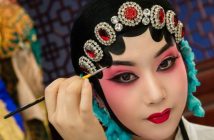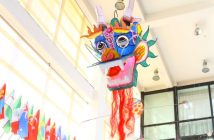
As a kid in Canada, Halloween was such a thrill. The smell of autumn in the air, the early navy blue sky, the crunch of fallen leaves under foot as we ran from door-to-door in our costumes “trick or treating,” make-up itchy on our skin, its smell usually reserved for our mother’s face; and even the occasional snowy Halloween when we had to re-fit our costumes over snow suits. Whatever the circumstance, it was an amazing rush, of both enjoyment and sugar!
Yet, as an adult, I rarely went to Halloween parties. If I did, I was the party pooper dressed in everyday clothes standing in a corner. By then, dressing up just wasn’t fun anymore. It felt childish. Or, worse: fake, dishonest, or sneaky, like I was trying to trick people. Trick or treat, indeed. It was never a treat. What happened to my childhood excitement?
Then China came into my life. Something about being a foreigner in China reminds me of the giddy pageantry of childhood Halloweens. Most everywhere I go, I am stared or remarked about. My clothing and style are constantly assessed. My appearance is perceived to be emblematic of my country or, more commonly, of all foreigners. Suddenly, I don’t have to dress up to be in costume; my foreign face, wardrobe, accent and manner accomplish this without trying.
Experiencing this in the early days of my expat life made me question exactly who I was. Or, more accurately, who I was trying to present as. The “me” who came to China had a set definition whose cues it had taken from my community in Canada, a nearly identical demographic to my own. Or, through colleagues in my professional field whose style and political leanings often mirrored mine.
But China took that mirror away. Here, I met people from all walks of life, entered a diverse range of professional fields on a part-time basis, and I had almost no grounds for a political opinion (at least not in the beginning) simply because a Westerner’s informed opinion cannot precede living under this alternate political system for awhile. In other words, China helped me discover other ways of being.
Then three huge life events unfurled: I fell in love in Mandarin; I became a wife in China; I became a mother in China. On yearly visits back to Canada my friends struggled to keep up. As the years added up, I may as well have been wearing an elaborate costume called “expat.” They hardly recognized me. I stopped caring.
I used to judge Halloween as meaningless, but it took having the opportunity to live in a new country to see that expanding one’s identity is not unlike trying on a costume. You have to try it before you’ll know if it fits! And since this experience can happen without the watchful (read: judgmental) eye of one’s established community back home, we expats have the luxury of loosening fixed self-definitions and proving, once and for all, that humans are always in flux.
So now, as my eldest is old enough to understand dressing up, I’ve become the Halloween advocate. While I may be stricter than my parents about processed sugar consumption, I hope I can convey the excitement of this uniquely North American holiday. And in the process, I hope my kids will subconsciously learn that one’s identity need never be fixed, that an adventure starts with both a playful spirit and an open mind, and that life is about trying on as many hats as we can patiently fit on our heads, sometimes even at the same time.
Trick or treat!
About the Writer
Ember Swift is a Canadian musician and writer who has been living in Beijing since late 2008. She and her husband Guo Jian (国囝), who is also a musician, have a daughter called Echo (国如一) and a newborn son called Topaz.
Photo: Steven Depolo (Flickr)
This article originally appeared on page 50 of the beijingkids October 2015 issue. Click here to read the issue for free on Issuu.com. To find out how you can get your own copy, email distribution@truerun.com.



